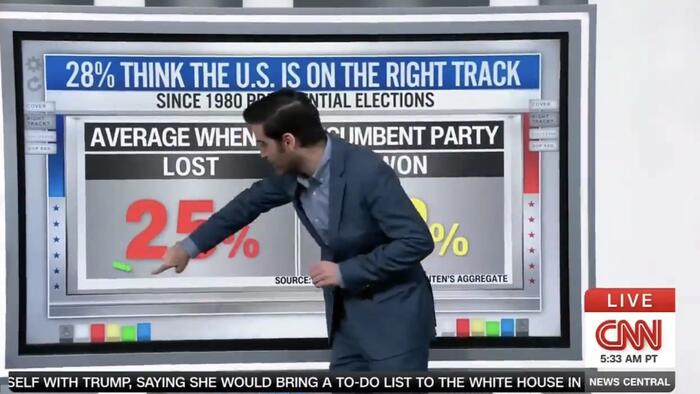In a recent analysis, CNN senior data reporter Harry Enten presented a compelling case indicating that former President Donald Trump is positioned to potentially win the upcoming election, based on several critical factors. Key elements contributing to this outlook include significant voter dissatisfaction with the current trajectory of the country under President Joe Biden, low approval ratings for Biden, and an increase in Republican voter registration numbers. According to Enten, only 28% of Americans believe the nation is headed in the right direction—a sentiment that historically correlates more closely with elections lost by the incumbent party rather than won. He emphasized that this figure aligns closely with the historical average of 25% for incumbent party failures, reinforcing the notion that voters’ optimism often declines ahead of a party’s electoral loss.
Enten further contextualized this data by comparing the current statistics to previous elections. He pointed out that the average percentage of Americans believing the country is on the right track during an incumbent victory is around 42%. The stark contrast with the current 28% paints a dismal outlook for Biden’s prospects, as historically, no incumbent has been re-elected under such low confidence levels among voters. He underscored that once voter sentiment leans towards the belief that the nation is not progressing positively, it has consistently resulted in a political shift against the sitting administration. This pattern serves as a historical warning that the current indicators suggest an uphill battle for Biden in retaining the presidency.
Beyond voter sentiment, Enten touched upon the implications of registration trends, highlighting that Republicans are increasingly outpacing Democrats in key battleground states. This shift indicates a potential for a stronger Republican electorate that could further cement Trump’s chances. The decline in the Democratic registration numbers relative to the rapid increase in Republican registrations suggests that Trump’s base could be expanding, making it critical for the Democratic Party to address these vulnerabilities if they are to expect success in upcoming elections. Ultimately, Enten concluded that all evidence points towards an environment in which Trump is primed for a possible win, indicating that the signs of this potential outcome have been available for some time.
In a contrasting narrative, a campaign advisor for Biden dismissed concerns surrounding his recent controversial remarks, suggesting such comments would not deter voter support. However, the implications of such rhetoric may not be entirely negligible. Observers noted that while the advisor is optimistic, some undecided voters might feel alienated by the dismissive language, potentially influencing their choice to support Trump instead. Indeed, Trump’s popularity seems to be on an upswing, with him recording a notable lead against Vice President Kamala Harris in political betting markets, illustrating a growing confidence in Trump’s prospects among voters and betters alike.
Polling expert Frank Luntz contributed to this discussion by identifying the “garbage” comment made by Biden as a pivotal moment that could sway public perception. He argued that such phrasing can alienate crucial undecided voters, making it a consequential factor in the evolving electoral landscape. Luntz’s insights reflect a broader concern that unguarded remarks from established politicians may inadvertently diminish support and complicate their electoral standing. With each statement, candidates risk alienating potential supporters, emphasizing the delicate balance that must be maintained in political communication as the campaigns progress.
As the election approaches, the dynamics between voter sentiment, party registration trends, and the implications of public discourse will play a significant role in determining the outcome. The stark indicators presented by Enten merit serious consideration, as they encapsulate a critical juncture in American politics where historical patterns, current public opinion, and candidate behavior coalesce to shape electoral realities. With Trump’s registration momentum and public discontent with Biden’s administration, the landscape appears favorable for a Trump resurgence, prompting questions about the effectiveness of the Democratic campaign strategy moving forward. In light of these factors, political analysts and voters alike should remain attuned to the evolving narrative and its potential ramifications for the upcoming election.

